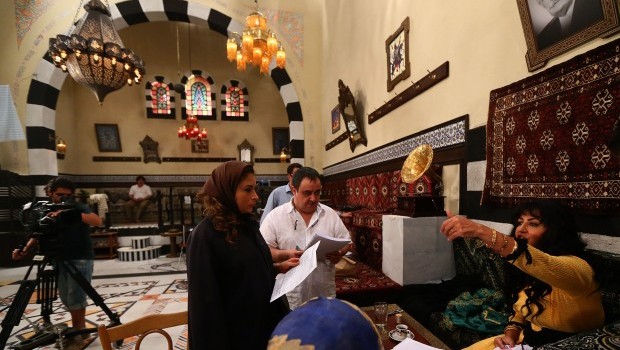
Syrian director Maamoun Al-Malla (C) guides Syrian actresses Waha Al-Rahib (R) and Dima Bayaa during shooting of a sequence of TV series “Hamam Shami” (“Syrian Bath”) in a studio in Abu Dhabi on June 3, 2013. (AFP PHOTO/MARWAN NAAMANI)
Observers of the Syrian arts scene say that Syrian drama is the biggest loser in the country’s cultural arena as the number of Syrian actors leaving the country continues to increase.
Like most investors in Syria, TV producers had left the country and embarked on making TV series for 2012–2013 season in other neighboring countries in a move considered to negatively affect the drama industry in the country.
The drama industry is one of Syria’s most important sources of income, employing thousands of Syrian youth as well as promoting Syria’s cultural and tourism sectors.
Basil Khatib, a well-known Syrian director, told Asharq Al-Awsat that he prefers to remain in Syria despite the many offers he received to make TV series abroad. At the beginning of the Syrian crisis, he announced he would never leave the country.
“I refuse to leave the country after all the support and encouragement it provided us with. I insist on staying despite all circumstances; I prefer to face the same fate that millions of Syrians are facing,” Khatib said.
For her part, Syrian actress Lama Ibrahim explains that not all actors left Syria because of their political stances; many have left for security and welfare reasons.
“Even I entertained leaving Syria, but I decided to remain in Damascus with my family,” she said.
Speaking to Asharq Al-Awsat, Damascene actor Faeq Irqsusi said that even if the war in Syria negatively affected the drama industry, actors should not leave Syria during wartime.
Tamer Ishaq, an emerging Syrian director, informed Asharq Al-Awsat that because of the increasing number of actors leaving Syria, all of this season’s TV series are being filmed abroad.
“But there are actors who remained in [Syria] and should not be ignored,” he added.
“As for the ones who have left Syria, they are considered to be among the pillars of Syrian drama,” and are indispensable, Ishaq insisted.
He also revealed that he himself was forced to film parts of his latest work in Beirut as security deteriorated in Damascus and other Syrian cities.
Actor Mohamed Al-Jarrah, from Aleppo, said he thought it was natural for Syrian actors to leave the country at such a time. For him, actors are like everybody else in Syria, who seek to relocate with their families to safer places and look for better work opportunities.
He said that the movement of actors is controlled by production companies. Last year, for example, because most producers were in the country, all works were filmed in Syria. This year, however, most production companies are making TV series abroad, mostly in Lebanon and United Arab Emirates.
